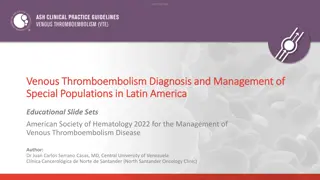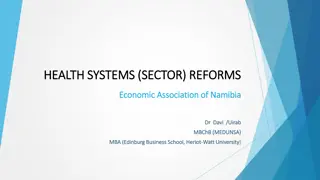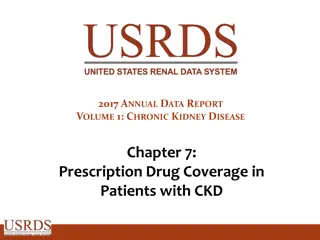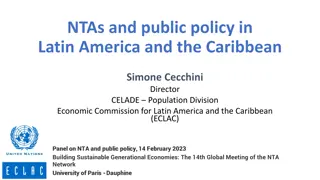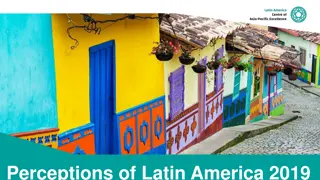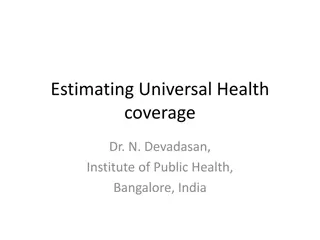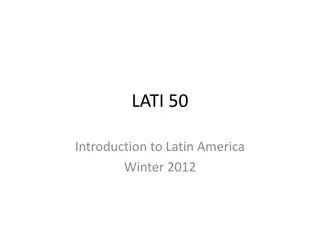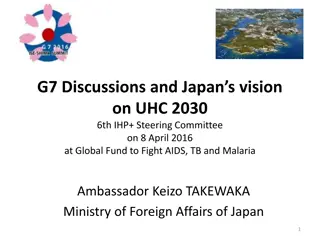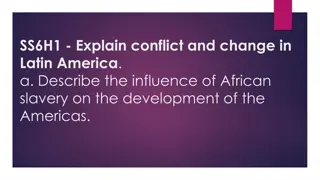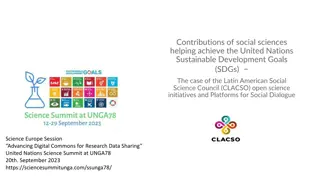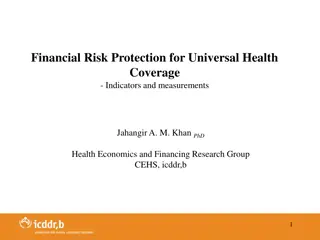Achieving Universal Health Coverage: Insights from Latin America
The Lancet Series on Universal Health Coverage in Latin America explores the importance of the Latin American nations' experience in the global context, addressing profound inequalities, policy experimentation, and the quest for Universal Health Coverage. The series delves into political and technical themes, calling for health system reform, overcoming social segregation, and highlighting social determinants of health. Expert comments and perspectives from global leaders emphasize the moral imperative and societal engagement needed to achieve universal health coverage.
Download Presentation

Please find below an Image/Link to download the presentation.
The content on the website is provided AS IS for your information and personal use only. It may not be sold, licensed, or shared on other websites without obtaining consent from the author. Download presentation by click this link. If you encounter any issues during the download, it is possible that the publisher has removed the file from their server.
E N D
Presentation Transcript
Universal Health Coverage: Not Why, What or When But How? Distinctive Knowledge from Latin America THE LANCET SERIES ON UNIVERSAL HEALTH COVERAGE IN LATIN AMERICA Dr. Jeanette Vega Senior Editor
WHY IS THE EXPERIENCE OF LATIN AMERICAN NATIONS OF GLOBAL IMPORTANCE? A long commitment and difficult quest for UHC: Profound inequalities Policy experimentation Shortfalls in results and unintended consequences Continued innovation
CROSS-CUTTING POLITICAL AND TECHNICAL THEMES AND A CALL TO ACTION Health System Reform and Universal Coverage in Latin America Overcoming Social Segregation in Health Care in Latin America Social Determinants of Health, Universal Health Coverage, and Sustainable Development: Case Studies from LA Countries Universal Health Coverage in Latin American Countries: How to Improve Solidarity-based Schemes Leading the Way Towards Universal Health Coverage: a Call to Action
8 COMMENTS FROM LEADERS AND EXPERTS Universal Health Coverage: Not Why, What Or When But How? Richard Horton, Pamela Das Achieving Universal Health Coverage is a Moral Imperative Carissa F. Etienne Human-rights-based Approaches to Health in Latin America Alicia Ely Yamin, Ariel Frisancho Health Protection as a Citizen s Right Alicia B rcena Conditional Cash Transfers and Health in Latin America Simone Cecchini, Fabio Veras Latin America: Priorities for Universal Health Coverage Jeanette Vega, Patricia Frenz The Right to Health: What Model for Latin America? Nila Heredia et al. ALAMES Towards Universal Health Coverage: Applying a Gender Lens Michelle Bachelet
3 GLOBAL LEADERS Michelle Bachelet, President of the Republic of Chile: Investment in the health and wellbeing of women and girls is not only the right thing to do from a moral and human rights perspective, but it is also smart, strategic, and cost-effective. Carissa Etienne, Director Pan American Health Organization: Universal health coverage requires the engagement of the whole of society, and the long-term political commitment of governments Alicia B rcena, Executive Secretary, Economic Commission for Latin America and the Caribbean: New social agreements, in both the social and the economic spheres, are the political instruments that will drive advances towards universal health coverage.
THE RIGHT TO HEALTH FROM CIVIL SOCIETY PERSPECTIVES The Right to Health: What Model for Latin America? By Nila Heredia et al. ALAMES the Latin American Association of Social Medicine ALAMES argues for the right to health for all citizens, without distinction, with the state as the guarantor... Human-rights-based Approaches to Health in Latin America. By Alicia Ely Yamin (Harvard University), Ariel Frisancho (Health Workforce Advocacy Initiative) The explicit use of human rights frameworks and strategies in the region has led to the exposure of systematic discrimination against marginalized populations; the reallocation of health budgets to improve equity; the enhancement of quality of care...increased oversight of health systems; and, perhaps most importantly in the long term, to the appropriation of access to quality care as a political and legal entitlement by the public.
HEALTH SYSTEM REFORM AND UNIVERSAL HEALTH COVERAGE IN LATIN AMERICA BY PROFESSOR R ATUN ET AL Framework for Analysis of Context and Health Systems The Context Since the 1990s a distinct approach to UHC has emerged, underpinned by principles of equity, solidarity, and collective action to overcome social inequalities. Epidemiological Demographic Political Health System Governance and Organisation Equity Efficiency Health Public Health Legal/ Regu- latory Financial Protection Ecolog- ical Financing Health Care Services User Effectiveness Responsiveness Satisfaction Resource Management Technological Economic Socio-cultural Source: Atun R, Aydin S, Chakraborty S, et al. Lancet 2013; Published online June 27, 2013 http://dx.doi.org/10.1016/S0140-6736(13)61051-X
OVERCOMING SOCIAL SEGREGATION IN HEALTH CARE IN LATIN AMERICA BY DR D COTLEAR ET AL Today, the institutional setup that organises the social segregation in health care is perceived, despite improved life expectancy and other advances, as a barrier to fulfilling the right to health.. Table 2: Historical Milestones for Four Phases of Health System History in Selected Latin American Countries Argentina Brazil Chile Colombia Costa Rica Mexico Peru Start of Phase 1: Independence 1816 1822 1818 1810 1821 1810 1821 Start of Phase 2: Creation of Ministry of Public Health 1946 1930 1924 1938 1927 1943 1935 Start of Phase 3: Merger of social security agencies for the exclusive benefit of salaried workers and their families 1971 1967 (creation of INPS) -- 1946 (creation of ISS) 1973 1982 (railroad workers join IMSS) 1973 (creation of IPSS) (compulsory affiliation to Obras Sociales and creation of PAMI) (Integration of social security and Ministry of Health hospitals) Start of Phase 4: Either integration of social security and Ministry of Health or implementation of actions to equalize Ministry of Health with social security -- 1989 (creation of SUS) 1952 2012 1984 2004 (Seguro Popular) 2010 (legislated, not yet implemented) (creation of SNS; 1979 creation of Fonasa as one public payer; and 2005 [AUGE]) (equal benefit plans mandated by constitutional court are implemented) (integrated informal workers to CCSS) PAMI = Programa de Atenci n M dica Integral. INPS = Instituto Nacional de Previd ncia Social. ISS = Instituto de Seguridad Social. IMSS = Instituto Mexicano del Seguro Social. IPSS = Instituto Peruano de Seguridad Social. SUS = Sistema Unico de Sa de. SNS = Servicio Nacional de Salud. AUGE = Acceso Universal con Garant as Expl citas. CCSS = Caja Costarricense de Seguridad Social.
SOCIAL DETERMINANTS OF HEALTH, UNIVERSAL HEALTH COVERAGE, AND SUSTAINABLE DEVELOPMENT: CASE STUDIES FROM LATIN AMERICAN COUNTRIES BY PROFESSOR R ATUN ET AL Panel 1: Domains of Intersectoral Action Design of intersectoral action: scope and target (general versus targeted) Domain 1 Organization, management and financing of intersectoral action Domain 2 Success of intersectoral action in reduction of health inequities (coverage and outcomes) Domain 3
FINANCING UNIVERSAL HEALTH COVERAGE IN LATIN AMERICAN COUNTRIES: HOW TO IMPROVE FINANCING AND SOLIDARITY BY MR DANIEL TITELMAN ET AL Figure: Health Expenditure and Gini Coefficient, by Region Gini coefficient Public and social security Private 0.55 20 17.9 0.45 15 Gini Coefficient (%) 8.4 0.35 GDP (%) 10.3 9.5 10 2.4 2.6 0.25 7.0 6.1 7.8 2.4 4.5 5 2.4 0.15 7.8 6.9 2.4 7.8 7.8 7.8 0 0.05 Europe (15) OECD USA Southeast Asia Africa Latin America Data are from reference 8. OECD = Organisation for Economic Co-operation and Development
LEADING THE WAY TOWARDS UNIVERSAL HEALTH COVERAGE: A CALL TO ACTION BY DR J FRENK In the quest for universal health coverage, Latin American societies are designing policies to guarantee three types of protection to all their members: protection against public health risk protection through quality assurance of health care, and financial protection Recent progress in several Latin American countries shows that universal health coverage is a reachable objective, and that the time to achieve it is now.
ACTION POINTS FOR MOVING FORWARD Traditional social insurance is leaving the poor and individuals without salaries behind. Democratization is pushing health systems built on value platforms that asume health is a social right. To finance UHC, countries are moving beyond traditional contributory schemes. Initiatives to strengthen health systems are needed to expand effective coverage, enhance efficiency, and improve equity. Intersectoral action to address health risks and social determinants of health has been a crucial component of UHC efforts. Transparency, accountability, and social participation are key elements of effective and equitable UHC.
FROM THESE LESSONS EMERGE 10 SPECIFIC ACTIONS Avoid separate coverage schemes for different population groups. Action 1 Reduce the burden of out-of-pocket payments. Action 2 Increase financing for health and the proportion from general government revenues. Action 3 Design upstream interventions to address the social determinants of health and downstream initiatives to deal with the burden of disease. Action 4 Establish effective mechanisms to monitor and ensure quality of care. Action 5
FROM THESE LESSONS EMERGE 10 SPECIFIC ACTIONS (CONT D) Improve the training, availability, and distribution of human resources for health. Action 6 Strengthen the key health system functions. Action 7 Strengthen the role of the state as the key steward of the national health system. Action 8 Invest in information systems, health system research, and rigorous assessment. Action 9 Stimulate transparency, accountability, and social participation in the design, implementation, and monitoring of UHC initiatives. Action 10
AN ADDITION TO THE GLOBAL EVIDENCE BASE FOR UHC Health for all .for real, now. In every country, and for everyone.
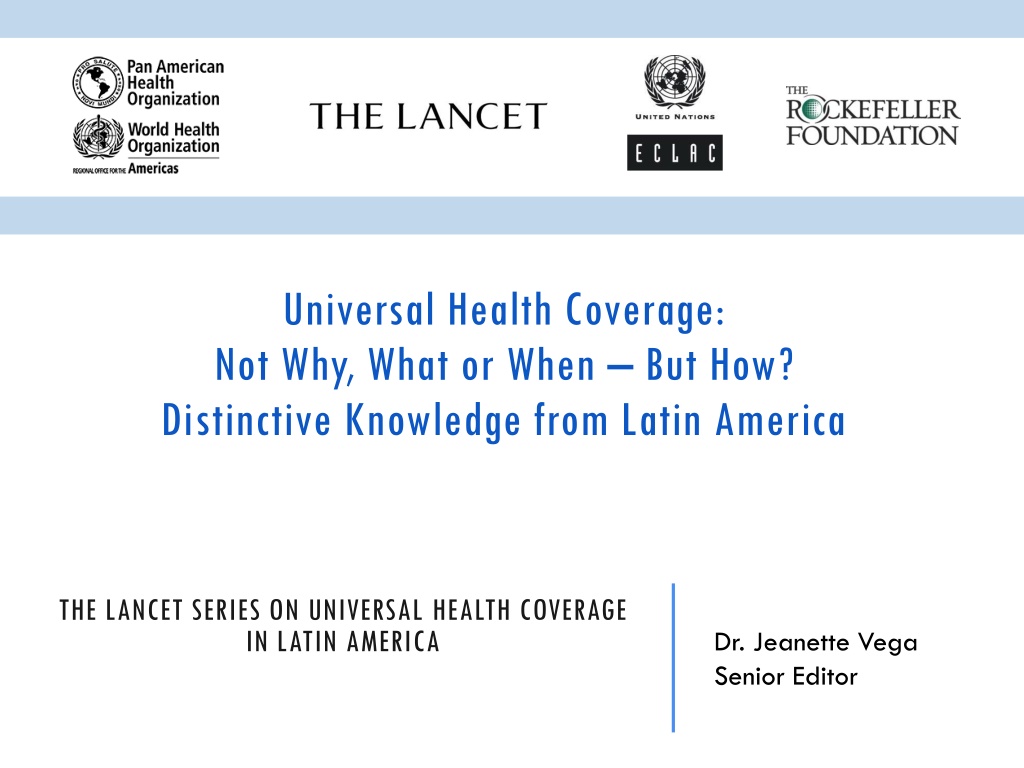
 undefined
undefined









